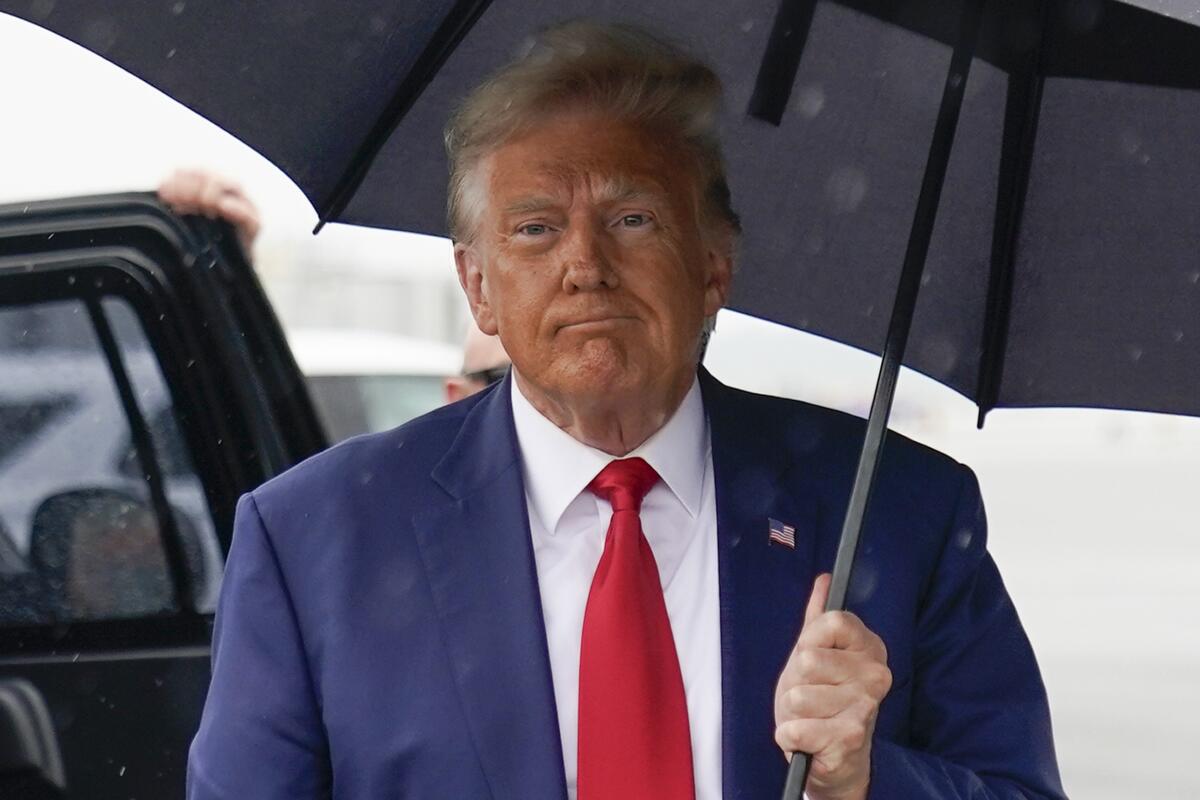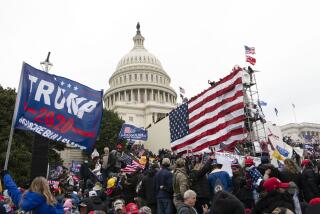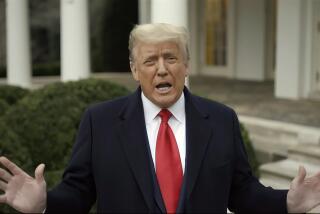Judge says Trump’s free speech rights ‘not absolute’ in 2020 election trial

- Share via
WASHINGTON — U.S. District Judge Tanya Chutkan said Friday that former President Trump’s right to free speech is “not absolute” ahead of the trial over efforts to overturn the 2020 election and stay in power. She approved restrictions on what evidence he and his legal team can publicly discuss before the trial.
Trump’s legal team and members of Justice Department special counsel Jack Smith’s team appeared before Chutkan at a hearing to resolve the language that will appear in a protective order dictating how information and evidence in the discovery process can be shared before and during the trial. A protective order is a normal part of a felony criminal trial.
“Mr. Trump, like every American, has a 1st Amendment right to free speech. But that right is not absolute. ... Defendant’s free speech is subject to the release conditions imposed at arraignment and it must yield to the orderly administration of justice,” Chutkan said.
Trump is charged with engaging in conspiracies to overturn the results of the 2020 election and keep him in power. He has pleaded not guilty.
Trump has criticized the limitations Smith wanted included in the protective order, saying that such restrictions on what he can talk about would impinge on his right to free speech.
Trump’s lawyer, John Lauro, repeatedly mentioned the 2024 election during the hearing, saying that restrictions on what information Trump can share online or on the campaign trail as he seeks the GOP presidential nomination could harm his chances.
“We are in uncharted waters, we have a defendant running for president and his opponent has the DOJ bringing charges against him,” Lauro said.
Chutkan said Lauro was “conflating what your client needs to do to defend himself and what your client wants to do politically. Your client’s defense is supposed to happen in this courtroom, not on the internet.”
She added that Trump making comments about witnesses, even if defending himself against opponents, could interfere with the case.
“The fact that he’s running a political campaign currently has to yield to the orderly administration of justice,” Chutkan said. “Regardless of what is going on with his, I hate to say, his day job, this is a criminal case. The need for this to proceed in normal order and protect witnesses, integrity of process means there are going to be limits on defendant’s speech.”
Chutkan stressed that the 2024 campaign will not influence the decisions she makes in the case.
“I cannot and I will not factor into my decisions the influence it will have on a political campaign on either side,” she said.
For the protective order, Chutkan rejected Smith’s request to restrict Trump and his legal team from disclosing any materials it receives as part of discovery to anyone other than his legal team, possible witnesses, the witnesses’ lawyers or others approved by the court. Instead, as Trump’s team requested, she narrowed the wording to prohibit Trump and his attorneys from disclosing materials deemed sensitive. Chutkan noted that the government can review whether the small amount of nonsensitive material it planned to hand over to the defense should be redesignated as sensitive.
She outlined what the order would include during the hearing, and filed it with the court later in the day.
Prosecutors said they feared Trump would obstruct the case by publicly sharing information that could interfere with finding an impartial jury or serve to intimidate witnesses.
Trump’s legal team, led by Lauro, suggested in a 29-page motion Monday that the court should loosely define and expand whom Trump can share sensitive information with to prepare his defense to “volunteer attorneys,” expert witnesses, investigators or others without “paid employment arrangements.” Chutkan rejected that request, saying it was so overly broad that even an unindicted co-conspirator could obtain access to the information.
“I’m not comfortable with that broad a definition, which could include just about anyone,” she said.
Lauro said not allowing the Trump legal team to use volunteers to process the evidence it will receive from the special counsel in the coming weeks will “hamstring us in incredible ways.”
“This is a massive case and it’s impossible to get ready [on the special counsel’s timeline of a Jan. 2 trial date] unless we’re able to enlist the help” of others, he said.
Chutkan also struck a compromise between what prosecutors and the defense requested from the court by deciding to allow Trump to review sensitive material without being accompanied by his legal team, but she retained the position that his notes must be checked to ensure he didn’t write down personally identifiable information. She also said that Trump cannot have access to an electronic device such as a cellphone or copying machine while reviewing sensitive materials. The defense will also be required to regain control of the materials whenever Trump is finished with them or takes a break, and he is not allowed to carry evidence around.
Prosecutor Thomas Windom, who addressed the judge on behalf of the special counsel, had pushed to require that a defense lawyer be in the room with Trump while he reviewed documents, saying it would reduce the risk of the former president photocopying or taking pictures of sensitive materials.
“He has shown a tendency to desire to hold on to material which he should not,” Windom said, nodding to the separate case Smith has brought in Florida charging Trump with retaining classified documents after leaving office.
Windom told the court that the special counsel will turn over its first production, including a hard drive and 11.6 million pages of evidence, once the protective order was finalized. He said all discovery production should be complete by the next hearing scheduled for Aug. 28, when Chutkan intends to set a trial date.
Chutkan wrapped up Friday’s hearing with a general word of caution for the defense, saying that the more a party makes “inflammatory statements” that could taint a jury pool, the “greater the urgency will be that we proceed to trial quickly.” .
“Even arguably ambiguous statements by the parties or their counsel, if they could be reasonably interpreted to intimidate witnesses or to prejudice potential jurors, can threaten the process,” she said. “I caution you and your client to take special care about your public statements about this case. I will take whatever measures are necessary to safeguard the integrity of these proceedings.”
More to Read
Get the L.A. Times Politics newsletter
Deeply reported insights into legislation, politics and policy from Sacramento, Washington and beyond. In your inbox three times per week.
You may occasionally receive promotional content from the Los Angeles Times.











